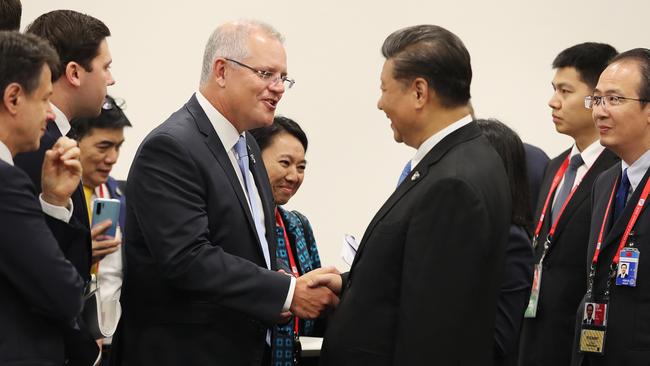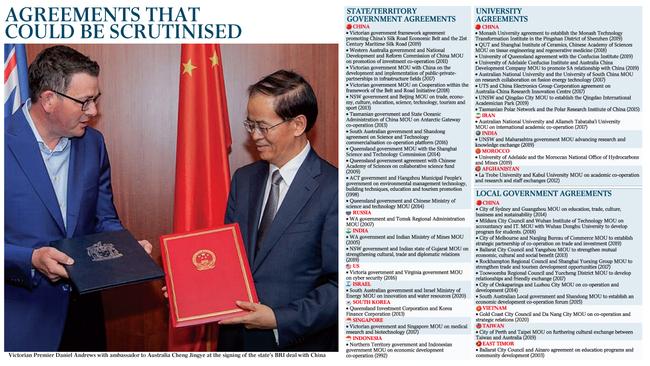
For years they’ve been walking blindly into agreements without any comprehension or obligation to consider the national security implications of these decisions.
Where they see dollar signs, the commonwealth security agencies see red flashing lights.
Daniel Andrews’s Belt and Road agreement with Beijing has been a major source of concern for ASIO and the government since it was signed in 2018. The Victorian Premier has never sought a briefing from ASIO on it. And this underscores the issue Scott Morrison has been dealing with.
Clearly, Andrews didn’t want to know the answer.
Morrison’s move to use the rarely used external affairs powers available under the Constitution will finally bring state and territory governments, councils and universities to heel on China.
The view within the federal government is that the time has come for the states to stop pretending they are sovereign nations on this issue.
The other message is to China. The seduction and duchessing of Australia’s provincial governors will no longer work.
Morrison has given tangible effect to the rhetoric. This move will significantly diminish China’s political influence within Australia. And it is highly unlikely any state premier will dare take Morrison on.
To challenge the proposed legislation in the High Court would assume a starting position for the states of standing against Australia. More importantly, it is more than likely they would fail.
The High Court has been firm in its upholding of the commonwealth’s constitutional powers.
In 1991, the court upheld the use of external affairs powers under the War Crimes Act.
This was regarded as a seminal case on the extent of the external affairs powers the Constitution gives the commonwealth. The case highlighted the broad-reaching interpretation of the commonwealth’s ability to set laws around Australia’s foreign affairs.
Before that, it backed Bob Hawke and Graham Richardson’s intervention in Tasmania to stop the Franklin Dam hydro power scheme.
Alfred Deakin laid the foundations for this precedent in 1901: “It would be judicious and advantageous to provide by Act that the commonwealth executive shall administer all existing state laws in regard to … treaties and conventions, and all other external affairs. These should be entirely under the control of the commonwealth. The whole scope and spirit of the Constitution require that, save for the purposes of their domestic policies within their own domains, the states shall be blended and absorbed into one political entity.

“They may still appear in some respects as a body of allied states but to the empire of which they form a part, and to the world without it, they have become and must remain a nation and a commonwealth one and indivisible.”
No federal government seeks to use the Constitution lightly to direct the states and territories.
Employing such powers will always test the boundaries of the Constitution.
But the Prime Minister’s view is that if there were ever a time to employ such powers, in the national interest, surely it is now.
The reason is very clear.
The states have no domestic security apparatuses of their own to deal with let alone consider the security implications of their decisions. They have no equivalent of the federal government’s national security committee of cabinet.
In effect, there is no machinery at a state level for this purpose. When they sign up with a foreign government they automatically step into a territory that the nation should decide on rather than a province.
Any controversy arising from Morrison’s move should focus on the absence of any will to pursue it in the past.
The Port of Darwin will remain a beacon of this provincial ineptitude.
While it would not have been necessarily captured under the new laws Morrison is proposing, it is a symbol of the need to act as one Australian voice when dealing with China.








Australia’s ability to speak with one voice on China has been consistently undermined by the often mindless deals between state governments and the Chinese Communist Party behind the commonwealth’s back.